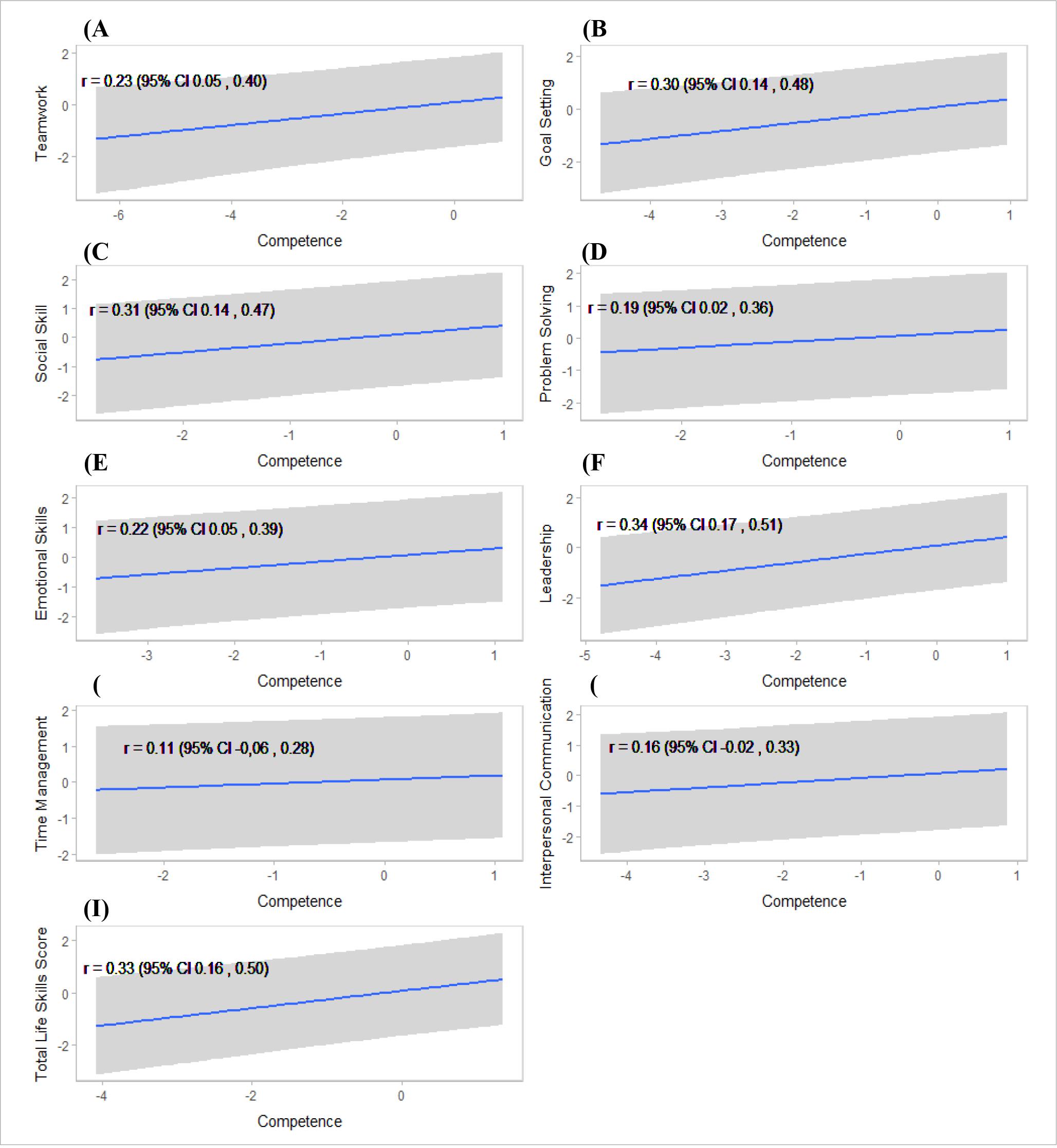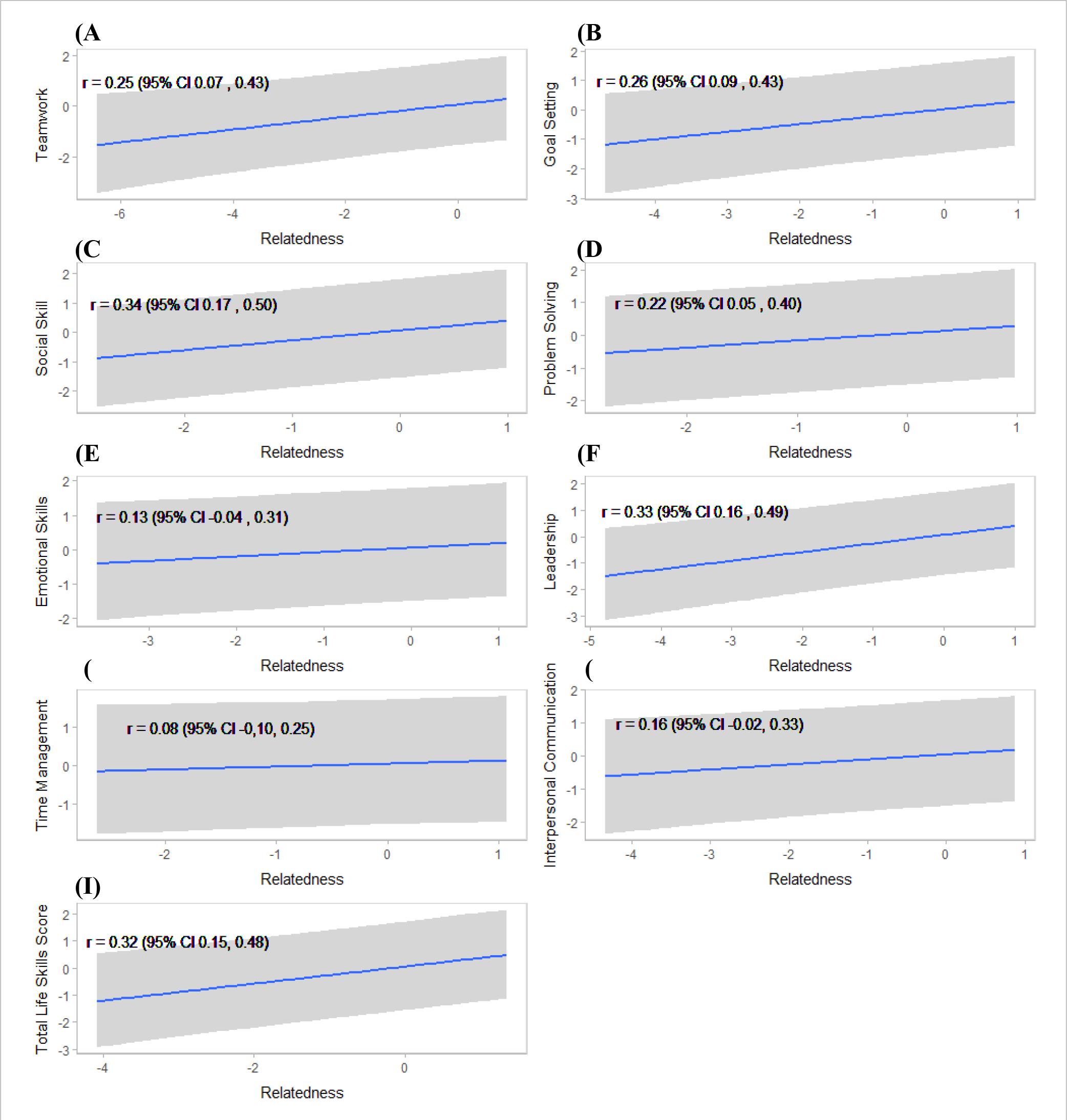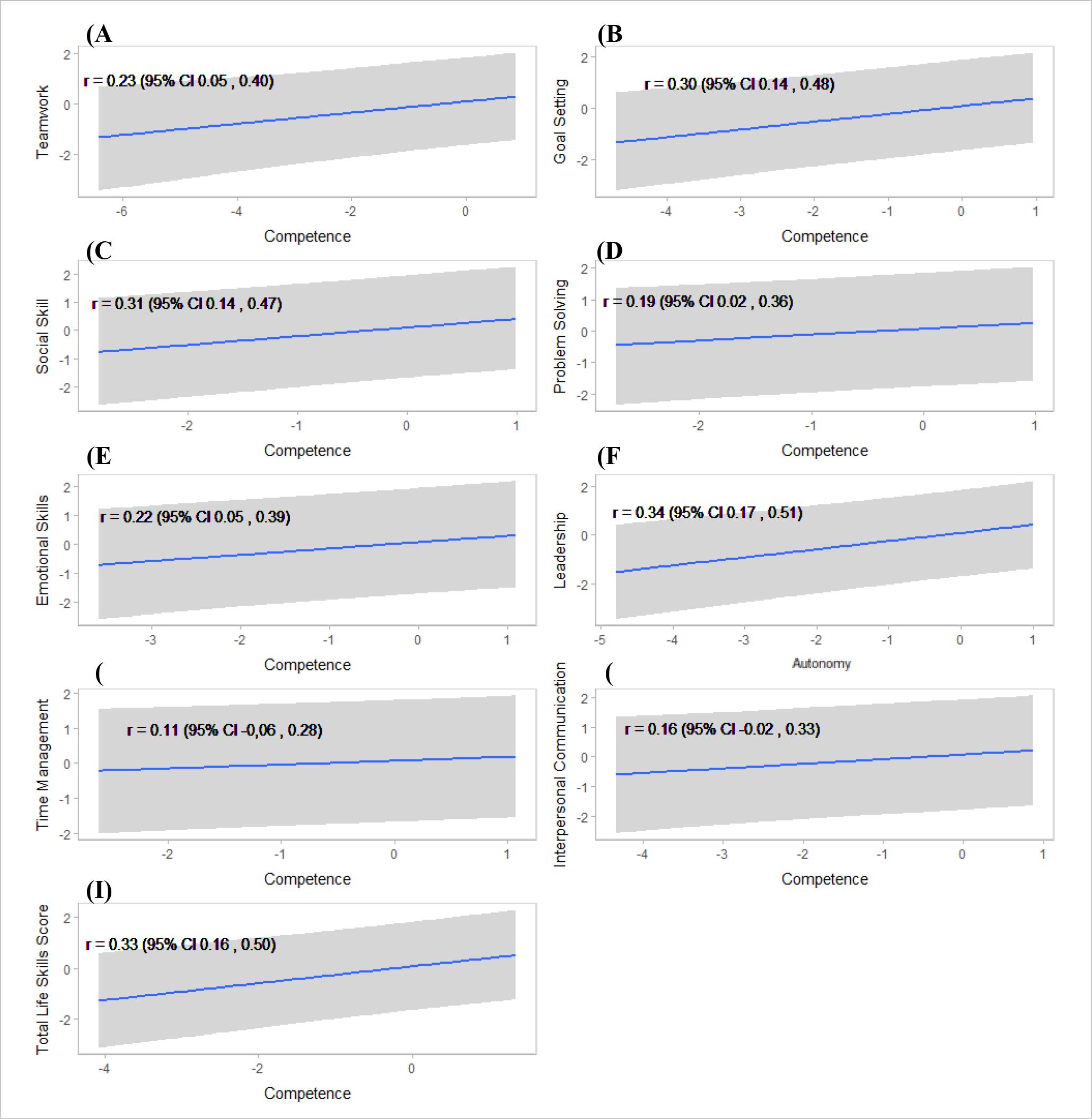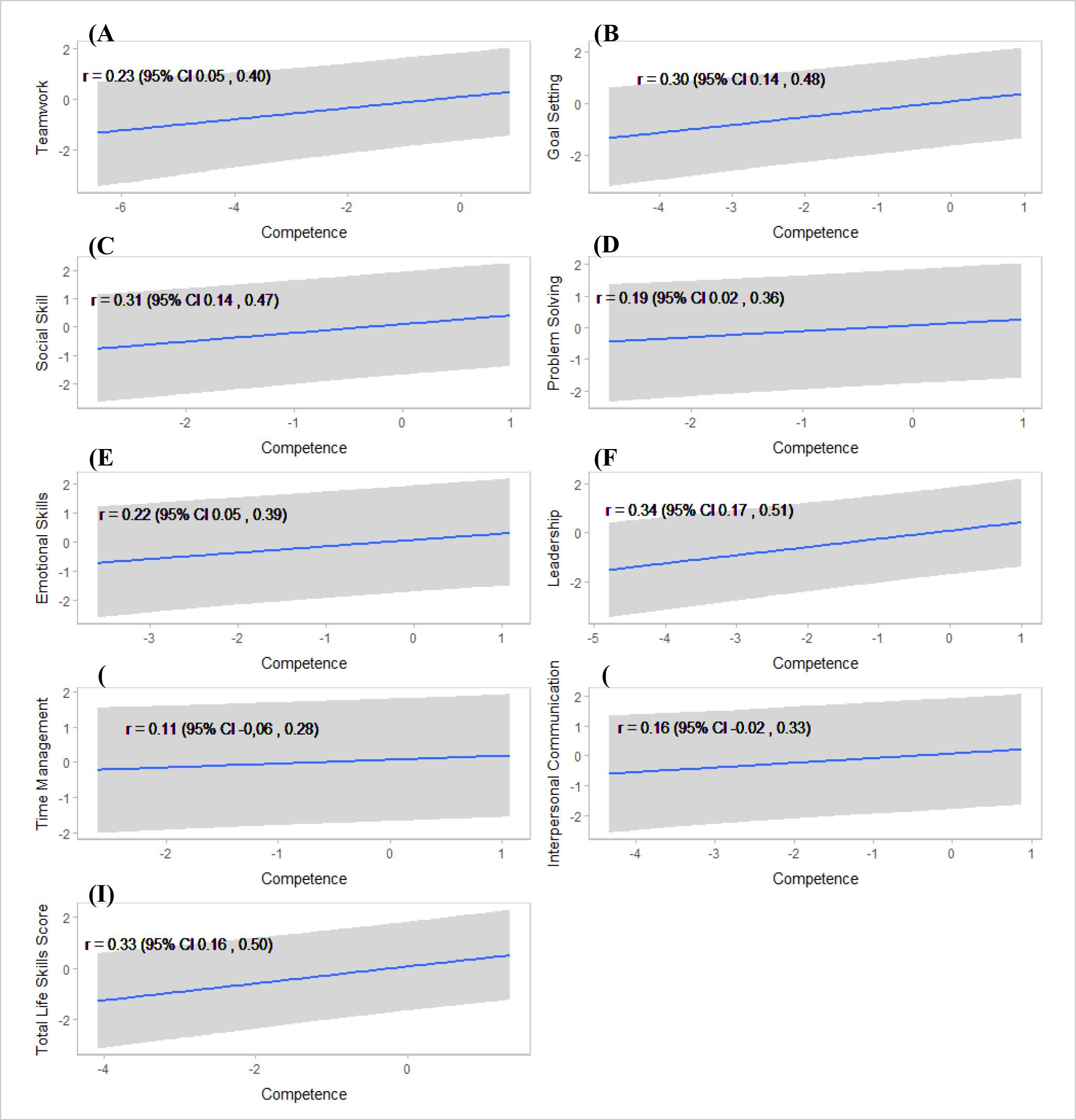INTRODUCTION
University athletes present several challenges within the social, cultural and individual aspects of following their sporting and educational paths (i.e., dual career) (Condello, Capranica, Doupona, Varga & Burk, 2019; Gayles & Baker, 2015). According to Stambulova and Wylleman (2015), a dual-career is defined as “a career with a primary focus on sport and study or work”. Thus, considering the most different sporting and educational contexts, researchers recommend strategies that promote student-athletes’ motivation for academic and sporting achievements (Quinaud et al., 2021; Stambulova, Ryba & Henriksen, 2020; Stambulova & Wylleman, 2015, 2019).
Motivation is considered a determinant psychological characteristic to keep people involved in the activities performed (Ryan, Bradshaw & Deci, 2019). One theory that holds great promise for observing motivation in dual-career athletes is the self-determination theory (SDT; Ryan & Deci, 2017). This is the case, for at its core SDT is a theory of human development and well-being, which in turn is closely related to customer satisfaction psychological needs of self-determination theory, a variable that has shown importance in the psychosocial development of athletes (Ryan & Deci, 2017). The satisfaction of the three basic psychological needs in any domain involves the satisfaction of the need for autonomy (ability to control their own actions), competence (ability to feel efficient in face of the challenges of social life) and relatedness (capacity to develop interpersonal relations) (Ryan & Deci, 2017). Understanding student-athletes’ motivation for dual-career is crucial to support their career development and transitions (Stambulova et al., 2020).
From this perspective, the relevance of sports satisfaction is for the well-being and performance of athletes inside and outside the sports context (Lundqvist, 2011). In addition, a motivational environment acts as a catalyst for motivating athletes in relation to their engagement in sports and, consequently, the development of life skills (Hodge & Danish, 1999). Recently, life skills have been defined by Williams, Neil, Cropley, Woodman and Roberts (2020) as “functional skills that individuals develop in one context (such as the home, school, sport, community, workplace) and that are also used effectively in other contexts beyond that in which they were learnt”. Examples of life skills include teamwork, social skills, leadership, goal setting and communication. Thus, Steptoe and Wardle (2017) highlighted that life skills are associated with people’s academic achievement, occupational success, and health.
According to the literature investigating which life skills are learned through sports, several models have sought to explain better how life skills (e.g., teamwork, social skills, leadership, goal setting and communication) can be developed through sports. The literature shows that young people develop life skills implicitly when coaches, parents and peers create a positive sporting climate (Bean, Kramers, Forneris & Camiré, 2018; Cronin et al., 2022; Holt et al., 2017; Nascimento Junior, Freire, Quinaud, Oliveira & Cronin, 2021). However, most of the research involving the development of life skills through sports practice was carried out with young sports practitioners (Cronin et al., 2022; Cronin et al., 2020; Freire et al., 2021; Nascimento Junior et al., 2021), which create a gap in the literature about the development of life skills in other populations, such as in dual-career athletes.
Applying the SDT to the development of life skills, Hodge et al. (2016) proposed a conceptual model in which they applied SDT more broadly to life skills interventions within the sporting context. The model demonstrates that perceptions of autonomy satisfaction could increase opportunities for people to solve problems and make decisions, act as a leader, and set personal goals to work towards, and competence and relatedness satisfaction in any domain extends to people’s social skills, interpersonal communication, and problem solving and decision making.
Based on this model, researchers found in British youth that support for teacher autonomy was positively related to the satisfaction of the three basic needs of students, total satisfaction of needs and development of life skills in physical education practitioners (Cronin et al., 2019). Additionally, a longitudinal study observed that satisfying students’ three basic psychological needs positively affected the development of life skills in physical education practitioners (Cronin et al., 2020). Recently, Cronin et al. (2022) observed in young sports practitioners that the satisfaction of the three basic psychological needs promoted the development of life skills in sport. In the Brazilian context, researchers also observed in young sports practitioners that the satisfaction of the three basic psychological needs promoted the development of life skills through sports (Nascimento Junior et al., 2021). Therefore, Leonardi et al. (2018) demonstrated that the interpretations of the behaviour of young athletes depend on biological characteristics such as gender (e.g., gender) and contextual characteristics (e.g., sport type, university type and funding).
Despite the importance of the three basic psychological needs in developing life skills, little is known about how this association occurs in dual-career athletes. Addressing this gap in the research literature will provide researchers and practitioners with more information about the three basic psychological needs that affect life skills development. Using the conceptual model of Hodge et al. (2016), our objective was to investigate whether total need satisfaction and three separate basic psychological needs (autonomy, competence and relatedness) predict the development of life skills in dual-career athletes adopting Bayesian multilevel modelling. Our hypothesis was that total need satisfaction, autonomy, competence, and relatedness would be positively associated with the development of life skills at group-level (e.g., female versus male), type of sport (e.g., individual versus team), type of higher education institution (e.g., private versus public) and financial support (e.g., no versus yes) in dual career athletes.
METHODS
Participants
Participants were a convenience sample of 136 Brazilian university athletes who trained and participated in club and university teams weekly and competed at a national level. The sample included 65 males and 71 females aged 17–23 (M= 21.78, SD= 3.37). Participants represented the following sports: individual sports (N= 51) and team sports (N= 85). All participants had participated in their sport for an average of 5.40 years (SD= 3.20), had been coached by their present coach for an average of 5.50 years (SD= 1.50), and had been with their current team for an average of 5.55 years (SD= 3.10). All participants were volunteers and signed the consent form to participate in the research.
Measures
Life skills
We used the Portuguese version (Nascimento Junior et al., 2019) of the Life Skills Scale for Sport (LSSS; Cronin & Allen, 2017) to measure participants’ life skills development in their sport. This scale uses the stem “This sport has taught me to. . ..” and 43 items follow this stem to assess eight life skills: teamwork (7 items; e.g., “work well within a team/group”), goal setting (7 items; e.g., “set challenging goals”), time management (4 items; e.g., “manage my time well”), emotional skills (4 items; e.g., “use my emotions to stay focused”), interpersonal communication (4 items; e.g., “speak clearly to others”), social skills (5 items; e.g., “get involved in group activities”), leadership (8 items; e.g., “organise team/group members to work together”), and problem solving and decision making (4 items; e.g., “think carefully about a problem”). Participants responded to items on a scale ranging from 1 (not at all) to 5 (very much). We calculated a total life skills score as in previous research (Cronin & Allen, 2018; Nascimento Junior et al., 2021). Past research has supported the factorial validity, test-retest reliability, and internal consistency reliability of this scale with youth sports participants (e.g., Cronin et al., 2018; Nascimento Junior et al., 2021).
Basic needs satisfaction
To measure youth sports participants’ basic psychological needs satisfaction, we used the Basic Needs Satisfaction in Sport Scale (BNSSS; Ng, Lonsdale & Hodge, 2011), which has been adapted and validated for the Brazilian sporting context (Nascimento Junior, Vissoci, & Vieira, 2018). This scale consists of 12 items divided into three subscales: competence (e.g., “I am skilled in my sport”), autonomy (e.g., “in my sport, I feel like I’m doing what I want to do”) and relatedness (e.g., “there are people in my sport who care about me”). Participants responded to items on a seven-point-response scale ranging from 1 (not entirely true) to 7 (totally true). Past research has supported the factorial validity, test-retest reliability, and internal consistency reliability of this scale with youth sports participants (Monteiro et al., 2018; Rodrigues et al., 2020).
The mean scores on the 1–7 response scale of the BNSSS revealed that university athletes scored relatively high for autonomy (M= 6.43; SD= .65), competence M= 6.00; SD= .84) and relatedness (M= 6.20; SD= .80) satisfaction. Based on these scores and the total need satisfaction (M= 6.22, SD= .59), The mean scores on the 1–5 response scale of the LSSS revealed that university athletes perceived they were developing their life skills through sports (M range= 3.98 to 4.52).
Study design and procedures
We used a cross-sectional research design with all data collected at a one-time point. Ethical approval (number: 1.324.4) for the research protocol was granted by the lead researcher’s university ethics and human research committee. Prior to data collection, we obtained permission from the organising committee of the sports tournament where the data collection took place and from the coaches of participating teams. Before completing the study survey, brief instructions were provided to participants about the purpose of the research and what was required when completing the survey. The survey took roughly 35 minutes to complete, and the order of the measures used in the survey was randomised to avoid order effects.
Data analysis
Considering the data is nested by its different group levels, multilevel models are required (Gelman & Hill, 2006). Not considering the differences between groups could lead to spurious correlations. Additionally, multilevel models can be fitted within a Bayesian method that combines sample data and prior distribution information to estimate a probability distribution (McElreath, 2020; Mengersen, Drovandi, Robert, Pyne & Gore, 2016). Thus, we applied multilevel models to analyse the associations between BNSSS and LSSS fitted by a Bayesian multilevel linear regression model. Models were applied considering LSSS dimensions scores and LSSS total score as population-level effects as well as age. All the outcomes were standardised (z-scores). Additionally, sex (e.g., female and male), type of sport (e.g., individual and team), type of higher education institution (e.g., private and public) and financial support (e.g., no and yes) were treated as group-level effects. Lastly, the models’ conditional effects were plotted. Models were regularised using weakly informative normal prior distribution for population-level effects (.10) and group-level effects (0.1). To guarantee the convergence of the Markov, we set two chains for 4.000 iterations with a warm-up of 1.000 iterations. Trace plots were used to verify the convergence of the Markov chains. The package “brms” (Bürkner, 2018), which uses the probabilistic language Stan (Carpenter et al., 2017), was used to run the analysis, which is available in the R statistical language.
RESULTS
The mean scores on the 1–7 response scale of the BNSSS revealed that university athletes scored relatively high for autonomy (M= 6.43; SD= .65), competence M= 6.00; SD= .84) and relatedness (M= 6.20; SD= .80) satisfaction. Based on these scores and the total need satisfaction (M= 6.22, SD= .59), The mean scores on the 1–5 response scale of the LSSS revealed that university athletes perceived they were developing their life skills through sports (M range= 3.98 to 4.52).
Figure 1 presents the correlations between competence dimension standardised score and LSSS dimension and total standardised score. It is important to mention that due to the use of more rigorous analysis, compared to traditional correlation, the interpretations of the estimates might not follow the parameters commonly used. It seems that higher values of competence might indicate higher values of goal setting (r= .30, 95%CI .14–.48), social skills (r= .31, 95%CI .14–.47), leadership (r= .34, 95%CI .17–.51) and total life skills (r= .33, 95%CI .16–.50). However, competence may not predict teamwork (r= .23, 95%CI .05–.40), problem solving (r= .19, 95%CI .02–.36), emotional skills (r= .22, 95%CI .05–.39), time management (r= .11, 95%CI .06–.28) and interpersonal communication (r= .16, 95%CI .02–.33).

Figure 1. Correlations between (A) competence and teamwork, (B) goal setting, (C) social skills, (D) problem solving, (E) emotional skills, (F) leadership, (G) time management, (H) interpersonal communication and (I) total life skills score adjusted by age, sex, type of sport, type of higher education institution and financial support.
Relatedness presented similar results as competence (Figure 2). However, in this case, relatedness might just predict social skills (r= .34, 95%CI .17–.50), leadership (r= .33, 95%CI .16–.49) and total life skills (r= .32, 95%CI .15–.48). When correlated with teamwork (r= .25, 95%CI .07–.43), goal setting (r= .26, 95%CI .09–.43), problem solving (r= .22, 95%CI .05–.40), emotional skills (r= .13, 95%CI -.04–.31), time management (r= .08, 95%CI -.10–.25) and interpersonal communication (r= .16, 95%CI -.02–.33), relatedness did not present being a basic needs satisfaction dimension that predicts those life skills dimensions.

Figure 2. Correlations between (A) relatedness and teamwork, (B) goal setting, (C) social skills, (D) problem solving, (E) emotional skills, (F) leadership, (G) time management, (H) interpersonal communication and (I) total life skills score adjusted by age, sex, type of sport, type of higher education institution and financial support.
On the other hand, autonomy might not have a strong correlation with life skills development dimensions standardised score and total life skills standardised score (Figure 3). The highest correlation was with leadership (r= .27, 95%CI .10–.43) and the lowest correlation was with problem solving (r= .13, 95%CI -.03–.31) and time management (r= .13, 95%CI -.04–.30).

Figure 3. Correlations between (A) autonomy and teamwork, (B) goal setting, (C) social skills, (D) problem solving, (E) emotional skills, (F) leadership, (G) time management, (H) interpersonal communication and (I) total life skills score adjusted by age, sex, type of sport, type of higher education institution and financial support.
Lastly, we plotted correlations between total basic needs satisfaction standardised score and LSSS dimension and total standardised score (Figure 4). Overall, correlations present higher estimates if compared with basic needs satisfaction dimensions. The highest estimates were with leadership (r= .42, 95%CI .26–.57) and total life skills score (r= .41, 95%CI .25–.57). As time management presented low estimate with basic needs satisfaction dimension, it also presented low estimate (r= .14, 95%CI -.02–.31) with total life skills score.

Figure 4. Correlations between (A) total need satisfaction score and teamwork, (B) goal setting, (C) social skills, (D) problem solving, (E) emotional skills, (F) leadership, (G) time management, (H) interpersonal communication and (I) total life skills score adjusted by age, sex, type of sport, type of higher education institution and financial support.
DISCUSSION
The aim of the present investigation was to evaluate the development of life skills in dual-career athletes using the BPN of SDT as a theoretical framework. Our new findings revealed that dual-career athletes perceived that they were developing their life skills and exhibiting high levels of autonomy, competence, and relatedness through the sporting context. Most of the research on developing life skills through sports has taken place among young sports practitioners (Cronin et al., 2019; Cronin et al., 2020; Cronin et al., 2022; Freire et al., 2021; Nascimento Junior et al., 2021). Interestingly, the participants in our study had total scores for life skills (4.29) that were much higher than the scores of participants in young sports (Cronin et al., 2022; Freire et al., 2021; Nascimento Junior et al., 2021) and school physical education practitioners (Cronin et al., 2019; Cronin et al., 2020). This finding can be explained by the fact that the perception of the development of life skills is increased when the practitioner is able to put into practice the demand of the sports during the exigencies of everyday life, such as training routines together with educational activities. Pierce, Gould and Camiré (2017) state that biological maturation is a factor that helps develop various life skills. Hansen and Larson (2007) state that the time of practice is a factor that can interfere with developing life skills through sports. Thus, as age and practice time advance, the perception of the development of these life skills tends to increase.
In relation to the satisfaction of the three basic needs, the results agree with the Theory of satisfaction psychological needs, which postulates that psychological well-being and optimal functioning are based on autonomy, competence and relatedness satisfaction (Deci & Ryan, 2017). When individuals show satisfaction with autonomy, competence and strengthening of social relationships, it can be said that the individual presents greater pleasure in sports and consequently a greater performance within the sports context (e.g., training and competitions), as well as in academic activities (e.g., work and exams) (Deci & Ryan, 2017; Rigby & Ryan, 2018).
In terms of our hypothesis, partially responding to our expectations, the Bayesian multilevel linear regression model demonstrated that all three basic needs combined (total need satisfaction) are related to the development of some life skills in dual-career athletes independent of sex (e.g., female versus male), type of sport (e.g., individual versus team), type of higher education institution (e.g., private versus public) and financial support (e.g., no versus yes). This finding is in line with previous cross-sectional studies (e.g., Cronin et al., 2019, 2020, 2022) within the context of sports and school physical education and supports the proposition of Hodge et al. (2016) that the satisfaction of the three combined needs is important for people to develop their life skills. According to SDT theory, basic needs of autonomy, competence and relatedness are universal elements essential for human development, its integrity, and general well-being (Deci & Ryan, 2017; Rigby & Ryan, 2018). Thus, our findings show that when athletes feel engaged and connected to their social environment, they are more likely to have higher levels of satisfaction with sports and other life contexts (e.g., academic), which reveals how relationships interpersonal relationships established in sports practices are intervening factors for the development of life skills in dual-career athletes.
Regarding competence satisfaction, the present study showed that competence satisfaction was directly linked to the development of goal setting, social skill, leadership and total life skills independent of sex (e.g., female versus male), type of sport (e.g., individual versus team), type of higher education institution (e.g., private versus public) and financial support (e.g., no versus yes). These findings are in accordance with the theoretical model of Hodge et al. (2016), which states that competency satisfaction significantly predicts life skills. According to satisfaction psychological needs, it is possible to affirm that athletes who have their basic needs met, especially about competence, tend to achieve greater satisfaction in their sports practice and consequently manage to develop a greater range of skills for life within the sporting context (Deci & Ryan, 2017; Rigby & Ryan, 2018). Thus, we understand that sport represents a context in which the athlete needs to feel capable of performing their tasks and responsibilities when training, including effort and involvement in activities.
Relatedness presented similar results as competence; we found that our Bayesian multilevel linear regression model demonstrated that relatedness satisfaction was directly linked to the development of goal setting, social skill, leadership and total life skills independent of sex (e.g., female and male), type of sport (e.g., individual and team), type of higher education institution (e.g., private and public) and financial support (e.g., no and yes). Showing that the feelings of connection and the intention to cultivate affective bonds with the people inserted in the context are important factors for creating bonds and social interaction. Furthermore, this finding corroborates the idea of Hodge et al. (2016) that relationship satisfaction should be associated with people’s social skills, while the findings supported the idea that relationship satisfaction should be related to people’s teamwork skills.
On the other hand, autonomy might not have a strong correlation with life skills development dimensions standardised scores and total life skills standardised score independent of sex (e.g., female versus male), type of sport (e.g., individual versus team), type of higher education institution (e.g., private versus public) and financial support (e.g., no versus yes). This finding corroborates the proposition that autonomy is a key factor influencing several positive factors within the sporting context, and autonomy satisfaction is the most central aspect of SDT (Rigby & Ryan, 2018; Ryan & Deci, 2017). Autonomy is mainly associated with work and the performance of tasks inside and outside the sporting context (Rigby & Ryan, 2018). This basic psychological need is satisfied as coaches transform daily training into meaningful tasks for the athlete to feel autonomous and, therefore, optimise performance and develop life skills.
Limitations and future directions
Although our study provides empirical evidence on the importance of satisfying the three basic psychological needs for the development of life skills in dual-career athletes, it is important to point out some limitations. First, because of its cross-sectional nature, the data obtained only allows us to make inferences of association between the variables but not inferences of causality. Therefore, future longitudinal studies should investigate the causal associations between basic needs satisfaction and life skills development in dual-career athletes. Second, the use of self-report measures has limitations in terms of response bias. Future studies should allow for assessments by the coach or academic directors of basic needs satisfaction and life skills development. Another study limitation was this study was that we assessed only certain aspects of SDT. In the future, other investigators might further assess other aspects of SDT as coach competence and relatedness support and/or parents’ support for the three basic psychological needs in their relationships to participants’ life skills development. Lastly, we only investigated a limited number of outcomes which could have been associated with life skills development in the sport. Therefore, future research could look to investigate alternative outcomes such as participants’ academic performance, physical health, resilience, and well-being.
CONCLUSIONS
Using Bayesian multilevel linear regression model, we found that satisfaction of all three basic needs combined (total need satisfaction) and separate autonomy, competence and relatedness was positively associated with the development of life skills in dual-career athletes independent of sex (e.g., female and male), type of sport (e.g., individual and team), type of higher education institution (e.g., private and public) and financial support (e.g., no and yes). From a practical point of view, these findings suggest that coaches and others seeking to help dual-career athletes develop life skills through sports should create a sports environment that positively addresses these SDT-based variables. Building upon our promising findings, we have presented several suggestions for improving future research in this area.















